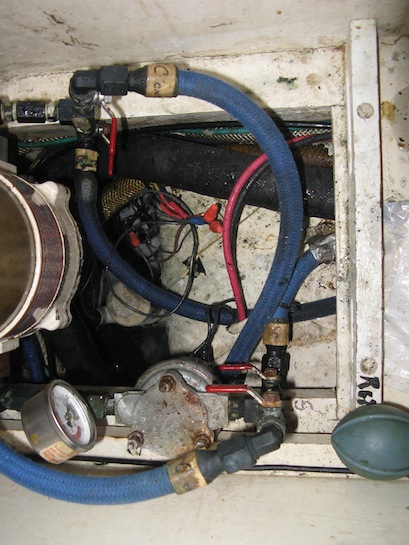We left the boat for two days … TWO DAYS and drove up to have an early Thanksgiving with my Dad. When we opened the companionway last evening, there was that distinctive oily smell that screams “BILGE BILGE BILGE”!
Our bilge is deep in a bottom dregs of the boat, unfortunately underneath a variety of hoses & stuff, aka totally impossible to reach, and therefore, clean. Before we left the boat last spring we hung upside down contorting into a variety of unnatural body positions to get every last bit of dreaded bilge crap out. At that point, we actually dried the bilge, closed the boat up and left for six months — leaving Roy to check on it weekly.

We checked it when we returned a month ago and all seemed fine – no stink, no odors at all. So all was good … at least until we returned from Thanksgiving. Ugh, it’s baacckkkk!
Peggie Hall, in her wonderful book “Getting Rid of Boat Odor” has a section devoted to “Boat Odors Are Not All In Your Head”. Her analysis is that the bilge is often the culprit, and our experience definitely supports Peggie’s. Paraphrasing Peggie: “most people’s approach to bilge cleaning consists only of throwing some bilge cleaner/and or bleach in when it starts to stink and calling that good”. Her analagy of a “bilge being a dark stagnant pond, a swamp — full of a variety of molds, fungi and bacteria … add in some dead and decaying sea water micro-organisms, dirt, food particles, rain water, wash water, hot weather and humidity, plus a little oil or diesel and you have a real primordial soup” — I LOVE this description, it couldn’t be more right on. If you don’t already have it, buy this book!
So anyway, we have primordial soup in our bilge & now we’re sucking it out with a turkey baster & bucket so we can get down to cleaning it – we use Joy to cut the grease and scrub scrub scrub. (Obviously my Tide concept from last spring didn’t totally succeed, although to this point we were good, so maybe expecting Tide to last more than a few months is unreasonable.) After we finish with this round of cleaning, I think we’ll use Tide to scrub it out and as Peggie recommends in her book, don’t forget to RINSE! 🙂

Back to work …. Anyone with brilliant ideas on how to keep this stuff from accumulating in the bilge, we’re all ears. We seem to go quite a while, but after David changes the engine oil, all bets are off. I’m wondering if sticking a so called “bilge pillow” would help catch the stuff as it comes in – keep in mind, we’re talking tablespoons, not cups or buckets – then I could simply discard the pillow and not have to re-scrub since it’s so hard to reach. Comments?














I have used the smallest size of baby diapers in the bilge or under the engine for spills.
It seems to suck up a lot of the liquid crude and makes it easier to get down to the last bit.
I have put them in and come back the next week and then disposed of them.
Hi John! Probably a lot less expensive than the 3M oil absorbent sheet we cut in half and wadded up to put in our bilge. I’ve heard of this before for changing oil but never for the bilge. THANKS for the tip! Cheers — Jan
just remember the diapers will absorb all liquid, oil and water. The 3M ones are generally made to take only the oil.
Good point Rick. We’ll see how the 3M sheet does. Thx, Jan
Go to an auto parts store and get the absorbent towels they have for oil spills. 1/3 the price of the”marine” ones and just as absorbent! We got a 48″ x 32″ perforated roll of these for $8.